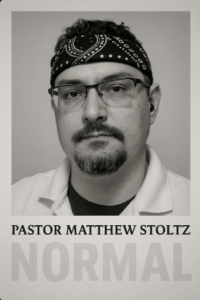BOUNDARIES: WHEN HEALTHY FEELS BORING & CHAOS FEELS LIKE LOVE
A Church of NORMAL Teaching
Stardate 2025.329
Introduction: The Hidden Reason So Many of Us Choose the Wrong People
Have you ever noticed that you feel a spark with people who bring chaos, intensity, or emotional volatility — but you feel “nothing” with someone stable, consistent, and genuinely kind?
You’re not broken.
You’re not “addicted to drama.”
You’re not cursed.
You’re wired.
This blog pulls together two teachings:
1. The Church of NORMAL Boundary Doctrine
Empathy without boundaries becomes self-abandonment.
2. Lise Leblanc’s Psychological Framework
Seven deep reasons why trauma survivors mistake toxicity for love and stability for boredom.
Together, they reveal one truth:
Your chemistry is not attraction — it’s trauma trying to repeat what it knows.
Let’s break this down.
🟣 Part 1 — The Boundary Doctrine (Revised & Integrated)
Boundaries aren’t walls.
They’re doors.
And you choose who gets a key.
Smart, healed people don’t argue with toxic behavior. They don’t fight in the mud. They don’t justify, debate, or explain their boundaries.
They simply state them — and follow through.
A boundary is not:
“You can’t talk to me like that.”
A boundary is:
“If you talk to me like that, I will leave the conversation.”
One tries to control the other person.
The other protects your nervous system.
And here’s the truth the Church of NORMAL stands on:
The only people angry about your boundaries are the ones who benefited from you having none.
Healthy people adapt.
Toxic people escalate.
The escalation is your answer.
🟣 Part 2 — Why Your Body Confuses Chaos for Chemistry
(Adapted from the work of Lise Leblanc)
This section is crucial — because it explains why boundaries are so hard for trauma survivors. Not because you’re weak, but because your nervous system was shaped by your childhood and past relationships.
Here are the seven hidden reasons healthy feels boring:
1. Your Nervous System Was Wired for Chaos
If love came mixed with yelling, inconsistency, coldness, or unpredictability, your body learned:
- love = adrenaline
- love = stress
- love = walking on eggshells
So stability feels foreign.
Predictability feels dull.
Healthy feels “boring.”
You’re not bored.
You’re unfamiliar with peace.
2. You Confuse Intensity With Intimacy
When childhood lacked validation or emotional presence, later:
- lovebombing feels like intimacy
- oversharing feels like connection
- trauma bonding feels like destiny
But that’s not intimacy.
That’s emotional fusion.
Real intimacy is slow.
Toxic intensity is fast.
Your body learned to chase the fast one.
3. You Were Overprotected or Sheltered
Overprotected children never learned:
- red flags
- manipulation tactics
- relational instincts
Toxic traits look exciting.
Healthy traits look plain.
Naivety is not a flaw — it’s a wound.
4. You Rescue to Feel Worthy
If you grew up parentified — being the fixer, mediator, or emotional adult — you learned:
“My worth = how much I save people.”
A healthy woman doesn’t need saving.
So you don’t feel needed.
And without being needed, you don’t feel loved.
That’s not attraction.
That’s a childhood role repeating itself.
5. Toxic Partners Help You Avoid Vulnerability
Chaos creates distraction.
Drama keeps the spotlight off you.
With a dysregulated partner, you’re always putting out fires — which means:
- you never look inward
- you never confront your own wounds
- you never explore your emotional needs
Their chaos becomes a hiding place.
6. You Mistake Control for Love
If you grew up controlled — even by a “well-meaning parent” — your nervous system equates intensity and dominance with connection.
A healthy equal partner feels confusing.
You’re not drawn to control.
You’re drawn to familiarity.
7. Early Abandonment Makes You Fear Stability
If someone left you — physically or emotionally — your inner child learned:
“I’m not safe unless I work for love.”
“I must prove myself to stay.”
So:
- calm feels suspicious
- kindness feels unearned
- consistency feels like a trick
- emotional availability feels overwhelming
You don’t stay with toxic partners because you love them.
You stay because your childhood fears are still driving the ship.
🟣 Part 3 — When These Patterns Collide With Boundaries
Here is the painful intersection:
People who grew up in chaos expect chaos,
and chaotic partners punish boundaries,
so boundaries feel dangerous.
Your body interprets:
- calm as rejection
- peace as boredom
- stability as a threat
- boundaries as abandonment
This is not your fault.
It is your programming.
🟣 Part 4 — Rewiring: What Healthy Love Actually Feels Like
Healthy love feels like:
- reliability
- clarity
- emotional presence
- steadiness
- mutual effort
- repair, not rupture
- accountability
- peace
- slow-building intimacy
At first your body won’t trust it.
It will flinch.
It will freeze.
It will pull back.
It will wait for the blow-up that isn’t coming.
This is your healing edge.
As Blu says:
“Peace is not boring.
Peace is what your nervous system sounds like when it finally feels safe.”
🟣 Part 5 — The Church of NORMAL Boundary Creed
1. I choose myself early, not after I’m drained.
2. I don’t negotiate with gaslighting.
3. I don’t explain my boundaries — I enforce them.
4. Silence is a response.
5. My inner child deserves safety, not intensity.
6. Healthy is not boring — it’s healing.
**7. The chemistry I chase is not attraction — it’s trauma.
And I do not worship trauma anymore.**
🟣 Part 6 — Closing Blessing: NORMAL Is Holy
In the Church of NORMAL, we say:
“Boundaries are not rejection.
They are self-respect in action.”
You were not made for chaos.
You were shaped by it.
But you can be reshaped.
And peace can become your new chemistry.
Your new home.
Your new NORMAL.



